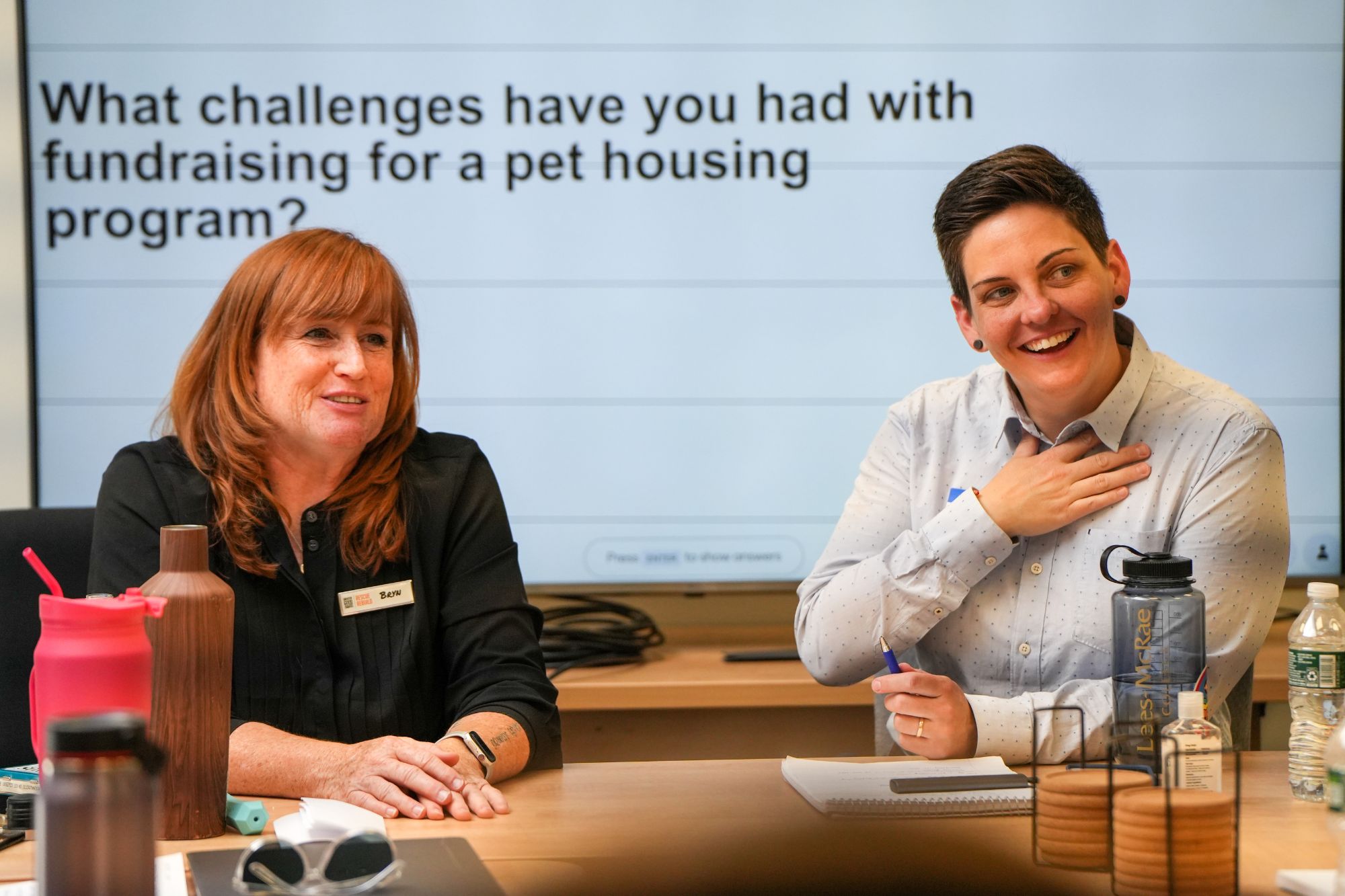Whether you’re coming from the human or animal side of service, we know that creating or even supporting a pet housing program can be challenging. You may be asking yourself: Do we have enough space for pet housing? Do we have the funding to create and sustain this program? How do we manage pet allergies?
These are really important questions to consider in creating your pet housing program – they’re also questions that we can help you solve! But the one question I want to talk to you about today, is
“What do I do when I have staff and/or board members who aren’t buying in?”
Creating staff and board buy-in is an important piece of the puzzle and one that will help make sure your program runs smoothly and efficiently and can stand the test of time.
My first piece of advice: give your staff and board room for the “no.” One of the questions I almost always ask groups during training is: What are the barriers to creating and/or supporting a pet housing program”. Seriously, give folks the chance to “CATastrophize!” You’ll likely hear a lot of the barriers and challenges that you’ve already thought of, but you’re also likely to hear some concerns that you hadn’t considered before. (hint, hint: the list you put together may be long, so stay positive and committed to the process. The next step is a MUST).
My second piece of advice: work with your staff and board to get to “yes.” That’s right, involve them in the problem-solving process. Just as they came up with new barriers and challenges, they’ll also come up with new solutions! Remember, you solve problems on a daily basis (whether you’re from the human or animal sector), so you’ve got this! You’ll work through problems more creatively AND they’ll feel more invested in the process and program. That’s a win-win for everyone!
But, what about those staff and board members that just don’t get it? You know, the folks who don’t see the value in this kind of programming? I’m going to be frank here: Quite simply, we can’t support one group without supporting the other – people and pets.
In this case, I find it really helpful to walk folks through the “why” of pet housing programs. Here’s some helpful statistics to aid this discussion:
- 95% of pet owners consider their pet to be an important part of the family. ¹
- Roughly half of domestic violence survivors will delay leaving an abuser out of concern for their pet. ²
- 97% of survivors shared that keeping their pet with them factors into their decision to seek shelter. ³
- Between 22-57% of unhoused women report DV was the immediate cause.
- 10-25% of people experiencing homelessness do so with a pet. ⁵
- 91% of survivors shared that their pets plays a significant role in their ability to survive and heal. ³
We also know that the human-animal bond is extremely powerful and can even help reduce things like stress, high blood pressure, and depression in humans. Supporting the pets of people in crisis can also build trust, empathy, and lines of communication with pet parents. But, don’t just take my word for it. The Virginia Commonwealth University recently shared the benefits of companion animals for managing trauma. Here’s just a snippet
The presence of a companion animal can:
- Support social connection
- Lower levels of anger
- Remind them they are no longer in danger
- Reduce the severity of dissociation, depression, anxiety, and other symptoms of PTSD
Want to hear something else that’s pretty pawesome?! The Human Animal Bond Research Institute recently released a study that said pet ownership saves $22.7 billion in healthcare costs.
Let me remind you all, that we are talking companion animals here – someone’s pet. We’re not talking about service, therapy, or emotional support animals. How amazing is that?!
Looking for more than statistics? Then I encourage you to listen to the pet parents you encounter. Ask and listen to those pet parents calling your resource and intake lines. Ask those pet parents who might be showing up to your animal shelters to relinquish their pet(s). You can also hear pet parents tell their stories through the work of two amazing organizations – My Dog is My Home and the Urban Resource Institute.
One of the most impactful statements I’ve heard from pet parents experiencing DV and/or homelessness is
“My pet is my home.”
The bottom line: by creating pet housing programs, we remove a barrier to service for people in crisis – we provide the opportunity for people and pets to find safety and healing together. Bonus: folks, this kind of programming will help you do your job better for human and animal organizations alike, and can be an amazing fundraising tool (new donor demographic anyone?).
So, when you’re ready, we’ll walk with you on this journey! Through training workshops and presentations, our comprehensive website chock-full of resources and sample documents, and our one-on-one Coaching Program, we’ve got you covered. And, yes it’s all FREE!
¹ Brown, Anna, “About half of U.S. pet owners say their pets are as much a part of their family as a human member”, PEW Research Center. 2023. https://www.pewresearch.org/short-reads/2023/07/07/about-half-us-of-pet-owners-say-their-pets-are-as-much-a-part-of-their-family-as-a-human-member/
² Roguski, Michael, “Pets as Pawns: The Co-existence of Animal Cruelty and Family Violence.” (2012).
³ PALS, “Domestic Violence and Pets: Breaking Barriers to Safety and Healing”, Urban Resource Institute, National Domestic Violence Hotline. 2019. https://urinyc.org/palsreport/
⁴ Administration for Children and Families, “Domestic Violence and Homelessness: Statistics”, U.S. Department of Health and Human Services. 2016. https://www.acf.hhs.gov/ofvps/fact-sheet/domestic-violence-and-homelessness-statistics-2016
⁵ Rhoades H, Winetrobe H, Rice E. “Pet ownership among homeless youth: associations with mental health, service utilization and housing status”, Child Psychiatry Hum Dev. 2015. https://www.ncbi.nlm.nih.gov/pmc/articles/PMC4194276/
Katie Campbell is the President and CEO of RedRover. She holds a Masters of Science degree in Sociology from California State University, Sacramento, and has spent 10+ years working in social services. Katie has spoken at several national conferences, including the National Organization for Victim Assistance, National Coalition Against Domestic Violence, and the Institute on Violence, Abuse, and Trauma.



